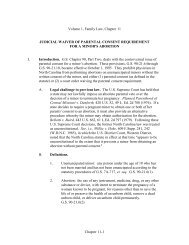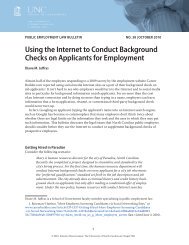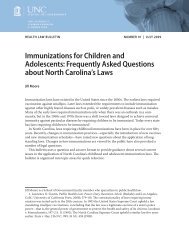Responding to Subpoenas for Health Department Records
Responding to Subpoenas for Health Department Records
Responding to Subpoenas for Health Department Records
- No tags were found...
Create successful ePaper yourself
Turn your PDF publications into a flip-book with our unique Google optimized e-Paper software.
September 2005 <strong>Health</strong> Law Bulletin No. 82If an at<strong>to</strong>rney sends the health department a validauthorization <strong>for</strong>m but no subpoena, the departmentmay still disclose the records. A subpoena istechnically not necessary. The authorization <strong>for</strong>malone provides sufficient authority <strong>for</strong> the healthdepartment <strong>to</strong> disclose confidential in<strong>for</strong>mation <strong>to</strong> anat<strong>to</strong>rney or the court.Question 29. How should I respond if thesubpoena <strong>for</strong> confidential medical recordsis not accompanied by an authorization<strong>for</strong>m?If the subpoena requests in<strong>for</strong>mation that issubject <strong>to</strong> a confidentiality law that requires a cour<strong>to</strong>rder or patient permission, such as the physicianpatientprivilege, the health department should notau<strong>to</strong>matically disclose the in<strong>for</strong>mation. It must,however, respond <strong>to</strong> the subpoena. As a first step, thedepartment (or the department’s at<strong>to</strong>rney) maycontact the at<strong>to</strong>rney requesting the records andexplain that they are confidential. The requestingat<strong>to</strong>rney may choose <strong>to</strong> withdraw the subpoena ormay take the necessary steps <strong>to</strong> authorize disclosure(such as obtaining a court order or permission fromthe person who is the subject of the records). If thatdoes not happen, the health department should eithercontest the subpoena (discussed in Question 23,above) or appear at the proceeding with the recordsand await further direction from the court (discussedbelow). You may follow either approach whensubpoenaed <strong>to</strong> a proceeding in court. 5151. Revised Rule 45(c)(5) establishes a time limit <strong>for</strong>moving <strong>to</strong> quash or modify a subpoena that is served morethan ten days be<strong>for</strong>e the proceeding—namely, such amotion must be made within ten days of service. (The rulewas not materially revised <strong>for</strong> subpoenas served less thanten days be<strong>for</strong>e the proceeding—the responding party maystill raise challenges at the time of the proceeding.) In ourview, if a subpoena <strong>for</strong> confidential records is served morethan ten days be<strong>for</strong>e a court proceeding, a cus<strong>to</strong>dian maybut is not required <strong>to</strong> make a motion <strong>to</strong> quash. A cus<strong>to</strong>dianstill may bring the records <strong>to</strong> the proceeding, as directed bythe subpoena, and await further direction from the courtbe<strong>for</strong>e disclosing them. We believe this <strong>to</strong> be so <strong>for</strong> tworeasons. First, a cus<strong>to</strong>dian who produces records in thismanner is not seeking <strong>to</strong> quash or modify the subpoena.Nor is the cus<strong>to</strong>dian disregarding the subpoena. Rather, thecus<strong>to</strong>dian is seeking <strong>to</strong> comply with the subpoena’scommands without violating confidentiality laws. Second,confidentiality laws are not personal rights of the cus<strong>to</strong>dian,which the cus<strong>to</strong>dian may waive by not making a motion <strong>to</strong>If you appear at the proceeding with therequested records, you should not immediately turnthem over <strong>to</strong> the subpoenaing at<strong>to</strong>rney or the court.Because the records are confidential, the healthdepartment has a duty <strong>to</strong> take affirmative steps <strong>to</strong>ensure that the records are only disclosed aspermitted by law. The exact way <strong>to</strong> handle eachsituation will depend on the confidentiality laws thatapply, but the approach will be similar in mostinstances. For example, a health department mayreceive a subpoena directing the records cus<strong>to</strong>dian <strong>to</strong>appear in court with certain patient records that areprotected by the physician-patient privilege. Thephysician-patient privilege law allows a district orsuperior court judge <strong>to</strong> order disclosure of records ifhe or she finds that disclosure is “necessary <strong>to</strong> theproper administration of justice.” 52 In this situation,the cus<strong>to</strong>dian may appear in court with the requestedrecords on the date and at the time specified in thesubpoena. The cus<strong>to</strong>dian should not release therecords ahead of time <strong>to</strong> the party who issued thesubpoena.Once the proceeding begins and the cus<strong>to</strong>dian isasked <strong>for</strong> the records, the cus<strong>to</strong>dian should explain <strong>to</strong>the judge that the records are protected by thephysician-patient privilege and that a court order isrequired <strong>to</strong> disclose them. If the records containsensitive in<strong>for</strong>mation, the cus<strong>to</strong>dian (or an at<strong>to</strong>rneyrepresenting the cus<strong>to</strong>dian) may request that thejudge review the records in camera—that is, inprivate, in his or her chambers—be<strong>for</strong>e decidingwhether <strong>to</strong> release them. 53 If the records are notquash. Rather, they establish the conditions under whichdisclosure may be ordered by a court (or would bepermissible without a court order, as when the subject ofthe records properly consents <strong>to</strong> disclosure). In contrast,other grounds <strong>for</strong> withholding documents in response <strong>to</strong> asubpoena, such as undue burden, are personal <strong>to</strong> the recordscus<strong>to</strong>dian and may be waived if not timely asserted.52. G.S. 8-53.53. See, e.g., Pennsylvania v. Ritchie, 480 U.S. 39(1987) (discussing procedure); Zaal v. State, 602 A.2d1247 (Md. 1992) (court may conduct review of records inpresence of counsel or permit review by counsel alone, asofficer of court, subject <strong>to</strong> restrictions protectingconfidentiality); see also Rios v. Read, 73 F.R.D. 589(E.D.N.Y. 1977) (judge may require in disclosure order thatparties who receive records not reveal their contents except<strong>to</strong> those connected with litigation). In the context ofin<strong>for</strong>mation related <strong>to</strong> communicable diseases, stateconfidentiality law authorizes in camera review if it isrequested by the subject of the in<strong>for</strong>mation. See G.S. 130A-143(6).15













